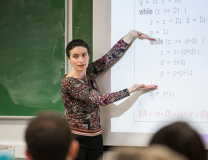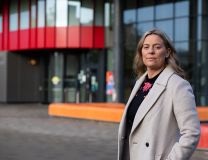


Innovative Maynooth University STEM projects funded under €5.2m SFI Ireland Discover Programme
Minister for Further and Higher Education, Research, Innovation and Science, Simon Harris, TD, today announced a national investment of €5.2 million through the Science Foundation Ireland Discover Programme.
The funding will support 49 public engagement and education initiatives that aim to improve public understanding of science, technology, engineering, and maths (STEM) and engage a wide audience of people with STEM topics.
Speaking about the announcement Minister Harris said: “I am delighted to announce the 49 projects that will receive funding through the SFI Discover Programme. As we continue to live through the COVID-19 pandemic, we are more conscious than ever of the importance of supporting the public to have access to and to understand the issues that impact our collective future, and the role science and technology can play in providing solutions. These projects will play a role in starting conversations about the role of STEM in society and inspiring our young people to explore careers in these areas. I wish all the recipients every success in the roll out of their projects.”
Universities in Ireland have recently recognised Leaving Certificate Computer Science as a science subject for entry into 3rd level, underlining the value of computer science as a STEM subject, which helps to train students in logical thinking and the science of problem solving in general.
The CoCoA project (Co-create Collaborate Activate - Advancing Computational Thinking Education) led by Dr Rosemary Monahan at the Department of Computer Science and Hamilton Institute, Maynooth University, will employ expertise and networks to adapt to problem-solving of in a novel way, to facilitate teamwork, develop communication and related language skills, and promote problem-solving skills through physical activity.
CoCoA will work to co-create teaching and learning resources that engage its target audience with CT. These resources will include lesson plans, resource books, and a suite of active games to encourage physical activity, communication, and teamwork. Resources will be co-developed and promoted through teacher workshops and school visits. The aim is to increase teacher, student, and parent interest, with a correspondingly enhanced involvement in STEM subjects. The project has received €149,375 in support funding, announced today.
Dr Monahan and the PACT team at Maynooth University Department of Computer Science develop teaching materials to enhance problem-solving skills through education in computational thinking. Recently, they have adapted some of their resources to promote computational thinking skills in primary and secondary school students. Their themed learning resources have featured on the RTE Learn website for St Valentine’s Day, and for events such as Easter, St Patricks Day and Seachtain na Gaeilge available here.
The STEM-Passport for Inclusion project (STEMP.inc), led by Dr Katriona O’Sullivan, Department of Psychology and the ALL (Assisting Living & Learning) Institute, aims to transform how disadvantaged women gain access to STEM courses. Young women from socially-economically disadvantaged (SED) backgrounds are not accessing STEM careers, due to a myriad of factors that include a lack role models, reduced STEM capital, and limited availability of STEM subjects.
STEMP.inc aims to challenge gender bias and support women to access STEM skills, through a three-tiered programme of STEM supports. Through partnership with the RDI Hub, Accenture, Microsoft, TeenTurn, Maynooth University and Munster Technological University, this project will make key changes to the existing systems, by researching and developing:
- an accredited STEM skills programme, preparing 1000 disadvantaged girls from Munster and Leinster for STEM courses;
- an accredited pathway into both Universities -- facilitating entry to STEM degree courses for disadvantaged girls who do not meet University matriculation requirements who have participated in the STEM skills programme and;
- a digital platform where girls are provided with a STEM profile where their STEM needs are identified and where all STEM activities, courses and career opportunities are housed.
A digital platform will also support STEM stakeholders, including students, NGOs, universities, schools, employers and policy makers, across Ireland to prepare young people for STEM futures. The project will serve as a pilot for a national STEM access programme by streamlining all STEM opportunities onto one digital platform called the STEM Passport.
STEMP.inc is a total €1 million project, receiving funding of €299,955 under SFI Ireland Discover Programme announced today, together with funding of €700,000 from industry and education partners, including financial support of €200,000 from Microsoft Ireland; support from RDI Hub Kerry (€40,000) and Prodigy Learning (€20,000). Accenture Ireland will provide support through developing and delivering the mentoring programme contributing 200 staff hours per year.
Dr Katriona O’Sullivan’s research is supported by Dr Aidan Mooney, Department of Computer Science at MU, Declan Markey from Maynooth Access Programme and Professor Gemma Irvine, the Vice President of Equality and Diversity at Maynooth University. Dr O’Sullivan is partnering with Munster Technology University on this project with Dr Helena McMahon supporting both development and delivery. Teen-Turn and Mercy Inchicore Secondary School are also partnering with Dr O’Sullivan to recruit young women and deliver the STEM activities.
About SFI Ireland Discover projects
Ireland Discover projects cover topics including biodiversity, STEM sign language, climate action and sustainability, coding, epilepsy, understanding pandemics, digital wellbeing, and the link between music, maths, and physics. The initiatives also target a wide range of ages including young children, teens, and adults as well as some initiatives designed for young people from disadvantaged backgrounds and attending DEIS schools and those living with sight loss. The full list of the 49 projects can be found here. Further information is available on SFI website here.
